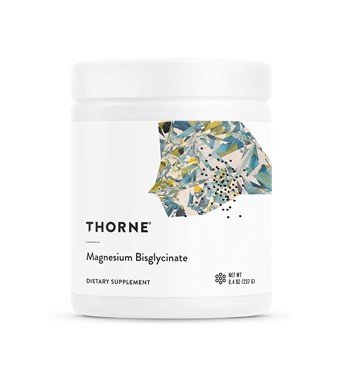Best Magnesium Supplements of 2023, According to Dietitians
Last Updated on December 26, 2022
Medically Reviewed by Anthony Dugarte, MD
Choosing the best magnesium supplement involves understanding which form is ideal for your specific needs. In this article, we’ll break down which magnesium is best, and why.


From regulating your blood pressure to helping your muscles contract, magnesium is a mineral found throughout your body that plays many essential roles.
This nutrient is vital for various metabolic processes within your body, including producing energy, building important proteins, and controlling blood sugar and blood pressure.
You’ll find magnesium in a variety of foods, including green leafy vegetables, whole grains, legumes, nuts, and seeds.
While many foods contain magnesium, evidence suggests that Americans may not be getting enough of this important nutrient. In fact, one 2017 study reported that up to two-thirds of the American population is magnesium deficient. (1, 2)
Therefore, magnesium supplementation has increased in popularity in recent years.
If you’re in the market for a magnesium supplement, you may be overwhelmed with the various choices available.
We evaluated some of the magnesium supplements currently on the market and put together a list of our top picks for your consideration.
Summary of Our Picks
- Best overall: Life Extension Magnesium Capsules
- Best budget pick: Now Foods Magnesium
- Best for leg cramps: Klaire Labs Magnesium Glycinate Complex
- Best for anxiety: Nested Naturals Magnesium Glycinate Chelate
- Best powder: Thorne Magnesium Bisglycinate
- Best liquid: Mary Ruth’s Magnesium Calm Liposomal
How We Chose These Brands
To narrow down the choices for the best magnesium supplements, we evaluated each product brand based on the following factors:
- Brand Reputation: Does the brand have a good reputation in the industry? Are the products made in a certified Good Manufacturing Practices (GMP) facility?
- Professional Involvement: Are there healthcare professionals involved with developing the product?
- Supported by Research: Is the brand committed to research?
- Price: Is the price of the product similar to other comparable products?
Best Overall: Life Extension Magnesium Capsules
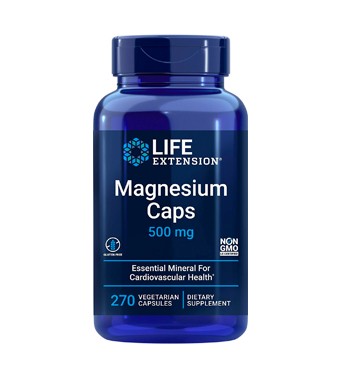
Pros
- Contains a variety of forms of magnesium
- Third-party tested
- Reasonably priced
Cons
- High dosage may have laxative effect for some people
- Little research surrounding magnesium succinate
Our Take
Life Extension’s Magnesium Capsules provide a variety of forms of magnesium that may help with gastrointestinal symptoms, and even anxiety and depression. This high-quality, third-party-tested product is also reasonably priced.
If you want a magnesium supplement that offers a variety of forms, is high quality, and reasonably priced, look no further than Life Extension’s Magnesium Capsules.
Each capsule delivers three different forms of magnesium, including magnesium oxide, magnesium citrate, and magnesium succinate.
This makes it one of the most versatile magnesium supplements available.
The magnesium oxide may help with gastrointestinal symptoms like constipation, heartburn, and indigestion, while the magnesium citrate may help to ease anxiety and depression.
Magnesium succinate is a form of magnesium that is attached to succinic acid. However, little information exists regarding using this type of magnesium for specific health conditions.
The product is gluten-free, vegetarian, and non-GMO.
Additionally, each of their products contains a Certificate of Analysis that allows you to confirm its quality and accuracy.
Life Extension’s Magnesium Capsules are manufactured in an NSF (National Sanitation Foundation) International-registered GMP facility.
Price: At $9.99 for 100 capsules on Amazon (100-day supply), this product is high quality and one of the most budget-friendly options out there.
Best Budget Pick: NOW Foods Magnesium Glycinate
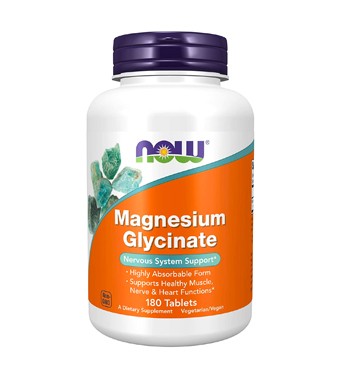
Pros
- Contains the highly absorbable form of magnesium glycinate
- Third-party tested
- Vegan and allergy-friendly
Cons
- Must take 2 tablets daily
Our Take
NOW Foods Magnesium Glycinate provides a highly absorbable form of magnesium that may have a calming effect within the body. This high-quality product is also third-party tested and very budget-friendly.
NOW Foods Magnesium Glycinate utilizes magnesium bound to the amino acid glycine, one of the most highly absorbable forms of the nutrient.
Magnesium glycinate is a great option for people who may be sensitive to other forms of magnesium as this form is easier to digest and won’t cause a laxative effect.
Additionally, studies have suggested that this form of magnesium may have a calming effect, which can help relieve stress, anxiety, and insomnia. (3)
NOW’s product provides this highly absorbable form of magnesium and is also vegan, non-GMO, and allergy-friendly. The product is free of wheat, gluten, soy, milk, eggs, fish, shellfish, and tree nut ingredients.
It is also third-party tested.
Price: Only $18.96 for 180 tables (a 90-day supply) on Amazon.
Best for Leg Cramps: Klaire Labs Magnesium Glycinate Complex
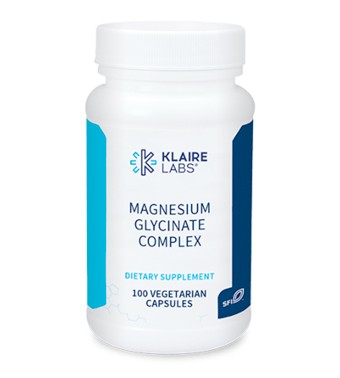
Pros
- Provides a highly absorbable form of magnesium
- Third-party tested
- Reasonably priced
Cons
- Not vegan
- 1 capsule provides 100 mg which may not be enough to meet people’s needs
Our Take
Klaire Labs Magnesium Glycinate Complex is a high-quality product that contains a highly absorbable form of magnesium that may help ease leg cramps.
The product is also allergy-friendly, third-party tested, and reasonably priced. However, the dosage of magnesium provided may not be enough to support its benefits.
Magnesium plays an essential role in muscle contraction, and research shows that a deficiency in the mineral may exacerbate leg cramps. (4)
While the scientific evidence is limited, if you’re experiencing frequent and intense leg cramps, you may be magnesium-deficient and benefit from a magnesium supplement.
Klaire Labs Magnesium Glycinate Complex provides a highly absorbable and well-tolerated form of magnesium that may help leg cramping.
Research suggests that magnesium glycinate may help ease leg cramps in pregnant women. (5)
The product is allergy-friendly and free of milk and casein, eggs, fish, shellfish, tree nuts, peanuts, wheat, gluten, soybeans, and yeast.
Klaire Labs Magnesium Glycinate Complex is third-party tested, manufactured in a GMP-certified facility, and free of artificial colors, flavors, and preservatives.
Price: The product is reasonably priced at 100 capsules for $18.99 (100-day supply) on Amazon.
Best for Anxiety: Nested Naturals Magnesium Glycinate Chelate
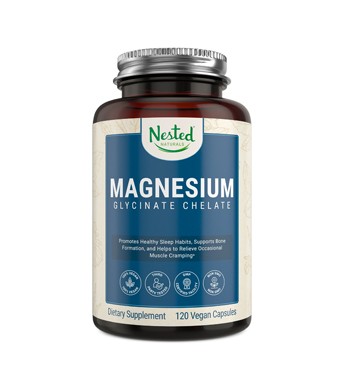
Pros
- Contains a highly absorbable form of magnesium
- Third-party tested
- Reasonably priced
Cons
- Serving size is 2 capsules
Our Take
Nested Naturals Magnesium Glycinate Chelate Supplement offers a highly absorbable form of magnesium known for its benefits on anxiety and stress. The product is third-party tested, vegan, allergen-free, and comes with a very reasonable price tag.
Often nicked-named nature’s “chill pill,” magnesium is known for its benefits on mood, anxiety, and stress.
Nested Naturals magnesium capsules are made with magnesium glycinate, which can be easily absorbed in the gut.
Additionally, the product has no laxative effect typically seen in other magnesium supplements.
While more research is needed, some studies have suggested that magnesium glycinate can have a calming effect and help relieve stress, anxiety, and insomnia. (3)
Nested Naturals Magnesium Glycinate Chelate Supplements are non-GMO, vegan, and allergen-free. The product is third-party tested and comes with a 100% lifetime satisfaction guarantee and an excellent return policy.
Price: Nested Naturals’ magnesium is also budget-friendly at $21.95 for 120 capsules (60-day supply) on Amazon.
Best Powder: Thorne Magnesium Bisglycinate
Pros
- Highly absorbable form of magnesium
- No added sugars
- Third-party tested
Cons
- More expensive than other magnesium supplements
Our Take
Thorne Magnesium Bisglycinate provides a highly absorbable form of magnesium in a convenient powder form. The product is high-quality and third-party tested, but also higher priced than other magnesium supplements.
Thorne Magnesium Bisglycinate is one of the best magnesium powders on the market because of its limited ingredient list and superior quality.
Unlike other magnesium powders, it’s flavored only with monk fruit concentrate and is free of added sugars, thickeners, artificial flavors, and colors.
The powder can be mixed with water, juice, or another liquid for a convenient, easy-to-consume dose of magnesium.
Furthermore, it supplies magnesium glycinate, a form that is highly absorbable and easily digested.
Thorne Magnesium Bisglycinate is made without gluten or other major allergens (eggs, tree nuts, peanuts) and is free of soy, dairy, yeast, shellfish, and fish.
All of Thorne’s products are made in a lab that meets quality and safety standards set by NSF International, and their supplements are also NSF Certified for Sport.
This means that they are free of more than 200 substances banned by many major athletic organizations.
Price: This high-quality product also comes with a higher price tag. Thorne Magnesium Bisglycinate costs $44.00 for a 60-day supply on Amazon.
Best Liquid: Mary Ruth’s Magnesium Calm Liposomal
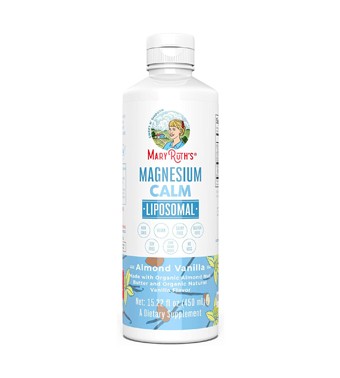
Pros
- No sugar or artificial sweeteners
- Easily absorbed
- Reasonably priced
Cons
- Contains nut allergens
- Not third-party tested
- Needs to be refrigerated after opening
Our Take
Mary Ruth’s Magnesium Calm Liposomal is a nice liquid alternative magnesium supplement. The product uses magnesium bisglycinate, which is better absorbed and doesn’t have a laxative effect.
While not third-party tested, Mary Ruth’s Magnesium Calm is made in a GMP Facility and is reasonably priced.
For people who don’t want to (or can’t) swallow pills, there are liquid alternatives that generally work just as well.
Mary Ruth’s Magnesium Calm Liposomal makes our list because, unlike most liquid supplements, this one is free from sugar and artificial sweeteners.
The product is also organic, gluten-free, soy-free, free from artificial colors, and non-GMO.
Mary Ruth’s Magnesium Calm Liposomal uses magnesium bisglycinate (two glycine molecules attached instead of just one), which is highly absorbable and gentler on the GI system compared to other magnesium supplements.
While the product isn’t third-party tested, it is made in a GMP Facility.
Additionally, Mary Ruth’s products come with a 100% money-back guarantee. If you have an issue with the product, the company will refund you in full and doesn’t require you to send it back.
Price: Whether purchased directly through the manufacturer or Amazon, a 30-day supply is $29.95.
Things to Consider When Shopping for a Magnesium Supplement
When analyzing a magnesium supplement, you’ll see a variety of items on the package. These may include:
- The type of magnesium in the supplement
- The recommended dosage
- Possible third-party certification
- Form of magnesium supplement-capsule, powder, or liquid
To narrow down the best choice for you, consider the following:
The Best Form for Your Condition
Specific forms of magnesium are more beneficial for certain conditions.
Selecting the best magnesium supplement for you involves understanding which type of magnesium is the best match for your specific health needs. (See “Understanding the Different Forms of Magnesium” below.)
For example, if you’re an athlete looking for a magnesium supplement to help with muscle soreness, taking magnesium oxide, which is best for constipation relief, may not benefit you.
It’s also important to check the ingredient list of your supplement to ensure it is compatible with your dietary restrictions and preferences.
It is always best to speak with your healthcare provider before taking any supplement to ensure its benefit and safety for you.
Third-Party Testing
Third-party testing will guarantee that your supplement was properly manufactured, contains the ingredients listed on the label, and does not contain harmful levels of contaminants.
Look for a label from quality testing companies like ConsumerLab.com, NSF International, and USP.
Contraindications
If you are taking any other supplements or medications, it is crucial to speak with your healthcare provider before taking a magnesium supplement.
While there are no contraindications for magnesium supplements with other prescriptions, various drugs can increase or decrease the concentration of either magnesium or the prescribed medication. (6)
More specifically, magnesium can interfere with antibiotics and medications used for diabetes or high blood pressure.
Understanding the Different Forms of Magnesium
There are many different forms of supplemental magnesium to choose from. These include:
- Magnesium citrate
- Magnesium glycinate
- Magnesium chloride
- Magnesium sulfate
- Magnesium oxide
- Magnesium sulfate
- Magnesium malate
Some forms are absorbed more readily into the bloodstream than others, and some specific forms have been helpful in treating specific health conditions.
The best magnesium supplement will depend on what your specific health needs are. For example, magnesium glycinate may help reduce anxiety, while magnesium oxide may be useful in easing constipation.
Below is a brief comparison of the different forms of magnesium and how they can best support your health and wellbeing.
Magnesium Citrate
This is one of the most common magnesium formulations, and some research suggests that this form is one of the most bioavailable, meaning most easily absorbed by your body. (7)
Magnesium citrate can be taken to replace low magnesium levels in the body and can also be used to treat constipation.
While more research is needed, according to one 2018 review, magnesium citrate may help alleviate symptoms of anxiety and depression. (8)
Magnesium Glycinate
Magnesium glycinate is a form of magnesium that is “chelated.”
Chelated magnesium means that the magnesium is attached to another compound, and in this case, it is the amino acid glycine.
When attached to glycine, magnesium has superior bioavailability, meaning you can easily absorb the majority of what you consume.
Magnesium glycinate offers a nice option for people sensitive to magnesium oxide or magnesium citrate since it’s easier to digest and won’t cause a laxative effect.
While more research is warranted, some studies have suggested that this form of magnesium appears to have a calming effect and may help relieve stress, anxiety, and insomnia. (3)
Magnesium Chloride
Magnesium chloride is easily absorbed, and is frequently used to treat low magnesium levels, heartburn, and constipation.
Magnesium Sulfate
Also known as Epsom salt, magnesium sulfate is typically dissolved in bath water to soothe sore muscles and relieve stress.
Magnesium Oxide
This form of magnesium is not typically used to prevent or treat a magnesium deficiency as this form isn’t absorbed well in your body.
Magnesium oxide is used mainly as a laxative to provide constipation relief and can also be used to treat mild digestive symptoms like heartburn and indigestion.
Research suggests that magnesium oxide may also be used to prevent and treat migraines. (3)
Magnesium Malate
Magnesium malate is another form of magnesium that’s well-absorbed by your body. It also appears to have less of a laxative effect than other types like magnesium oxide.
This form of magnesium is sometimes used to treat symptoms of fibromyalgia; however, further research is needed to analyze this benefit. (9)
To summarize:
| Formulation | Magnesium mixed with | Best for helping |
|---|---|---|
| Magnesium citrate | Citric acid | Constipation, anxiety, depression |
| Magnesium glycinate | Glycine (amino acid) | Stress, anxiety, insomnia, leg cramps in pregnancy |
| Magnesium chloride | Chlorine | Heartburn, constipation |
| Magnesium sulfate | Sulfur and oxygen | Sore muscles, stress |
| Magnesium oxide | Oxygen | Constipation, heartburn, indigestion, migraines |
| Magnesium malate | Malic acid | Fibromyalgia |
Frequently Asked Questions About Magnesium Supplements
What does taking a magnesium supplement help with?
If you’re not getting an adequate amount of magnesium through your diet, a magnesium supplement may offer a variety of health benefits. These include:
1. Reduction of blood pressure.
Magnesium plays a vital role in blood pressure control.
One 2016 Meta-Analysis found that taking 350 mg of magnesium per day significantly reduced both systolic blood pressure and diastolic blood pressure. (10)
2. Improved blood sugar control.
Magnesium plays a vital role in insulin and glucose metabolism. Research has shown that taking magnesium supplements may help improve insulin sensitivity and blood sugar control. (11)
3. Improved heart health.
Magnesium appears to benefit your heart health by helping to lower blood pressure and cholesterol levels.
One 2017 systematic review and meta-analysis found that magnesium supplementation reduced risk factors for heart disease by decreasing blood pressure, reducing blood sugar, and lowering LDL cholesterol and triglycerides. (12)
4. Alleviating migraine.
Magnesium may provide relief for migraine sufferers as low levels of magnesium have been linked with migraine onset.
One 2018 review found that a high dose (600 mg) of magnesium was effective for preventing migraines. (13)
When is the best time of day to take magnesium?
Generally speaking, magnesium supplements can be taken with food to avoid an upset stomach.
However, if you’re using magnesium as a laxative, it should be taken on an empty stomach with a full glass of water one hour before or two hours after eating.
If you’re using magnesium as a sleep aid, you should take it about 1 to 2 hours before you’d like to fall asleep.
Which is the best form of magnesium to take?
The best form of magnesium will depend on your specific health needs.
Magnesium citrate is highly absorbable and is used to treat constipation, and may help with anxiety and depression.
Magnesium glycinate is also highly absorbable and is used to ease stress, anxiety, and insomnia. This form of magnesium has also been shown to be helpful for leg cramps during pregnancy.
Magnesium chloride and magnesium oxide may help a variety of gastrointestinal symptoms, including heartburn, indigestion, and constipation.
How much magnesium should I take?
The recommended dose depends on the product, and you should always follow the dosage instructions on your magnesium supplement.
The daily Upper Tolerable Intake Level (UL) for magnesium for most adults is 350 mg. However, the magnesium you eat from food does not count toward the UL; only magnesium from supplements. (14)
What are the side effects of magnesium supplementation?
Many magnesium supplements will have a laxative effect on people and may cause diarrhea. Additional side effects may include upset stomach, nausea, and vomiting. (15)
Although rare, signs of magnesium toxicity may include a fall in blood pressure, muscle weakness, confusion, heartbeat disturbances, and trouble breathing. (15)
The Bottom Line
Feeling like you need a degree in chemistry to sort through the varieties of supplemental magnesium available? If so, you’re in good company.
Magnesium comes in various forms, and each form will have a different health benefit.
Before choosing a magnesium supplement, it’s important to understand what your specific health needs are and your goals for taking the supplement.
It is also essential that you look for a high-quality supplement that is free of potential contaminants and is suitable for your dietary restrictions.
Before taking a magnesium supplement, or any other supplement, it’s best to speak with your healthcare provider to ensure it is right for you.
At WellnessVerge, we only use reputable sources, including peer-reviewed medical journals and well-respected academic institutions.
- Suboptimal magnesium status in the United States: are the health consequences underestimated?:
https://pubmed.ncbi.nlm.nih.gov/22364157/ - The Importance of Magnesium in Clinical Healthcare:
https://www.hindawi.com/journals/scientifica/2017/4179326/ - Magnesium in headache:
https://www.ncbi.nlm.nih.gov/books/NBK507271/ - Magnesium in Prevention and Therapy:
https://www.ncbi.nlm.nih.gov/pmc/articles/PMC4586582/ - Oral magnesium for relief in pregnancy-induced legcramps: a randomised controlled trial:
https://onlinelibrary.wiley.com/doi/epdf/10.1111/j.1740-8709.2012.00440.x - Magnesium:
https://www.ncbi.nlm.nih.gov/books/NBK519036/ - Mg citrate found more bioavailable than other Mg preparations in a randomised, double-blind study:
https://pubmed.ncbi.nlm.nih.gov/14596323/ - The Role of Magnesium in Neurological Disorders:
https://pubmed.ncbi.nlm.nih.gov/29882776/ - Magnesium and malic acid supplement for fibromyalgia:
https://pubmed.ncbi.nlm.nih.gov/31150373/ - Effects of Magnesium Supplementation on Blood Pressure: A Meta-Analysis of Randomized Double-Blind Placebo-Controlled Trials:
https://pubmed.ncbi.nlm.nih.gov/27402922/ - A systematic review and meta-analysis of randomized controlled trials on the effects of magnesium supplementation on insulin sensitivity and glucose control:
https://pubmed.ncbi.nlm.nih.gov/27329332/ - Effect of magnesium supplementation on type 2 diabetes associated cardiovascular risk factors: a systematic review and meta-analysis:
https://pubmed.ncbi.nlm.nih.gov/28150351/ - Magnesium in Migraine Prophylaxis-Is There an Evidence-Based Rationale? A Systematic Review:
https://pubmed.ncbi.nlm.nih.gov/29131326/ - National Institutes of Health, Office of Dietary Supplements: Magnesium:
https://ods.od.nih.gov/factsheets/Magnesium-HealthProfessional/ - The Importance of Magnesium in Clinical Healthcare:
https://www.ncbi.nlm.nih.gov/pmc/articles/PMC5637834/

